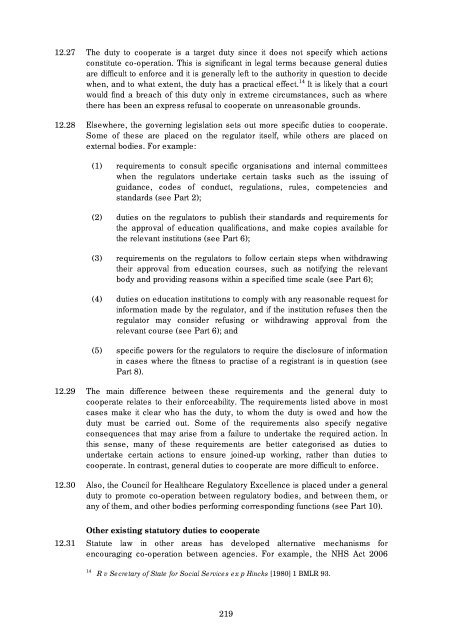Regulation of Health and Social Care Professionals Consultation
Regulation of Health and Social Care Professionals Consultation
Regulation of Health and Social Care Professionals Consultation
You also want an ePaper? Increase the reach of your titles
YUMPU automatically turns print PDFs into web optimized ePapers that Google loves.
12.27 The duty to cooperate is a target duty since it does not specify which actions<br />
constitute co-operation. This is significant in legal terms because general duties<br />
are difficult to enforce <strong>and</strong> it is generally left to the authority in question to decide<br />
when, <strong>and</strong> to what extent, the duty has a practical effect. 14 It is likely that a court<br />
would find a breach <strong>of</strong> this duty only in extreme circumstances, such as where<br />
there has been an express refusal to cooperate on unreasonable grounds.<br />
12.28 Elsewhere, the governing legislation sets out more specific duties to cooperate.<br />
Some <strong>of</strong> these are placed on the regulator itself, while others are placed on<br />
external bodies. For example:<br />
(1) requirements to consult specific organisations <strong>and</strong> internal committees<br />
when the regulators undertake certain tasks such as the issuing <strong>of</strong><br />
guidance, codes <strong>of</strong> conduct, regulations, rules, competencies <strong>and</strong><br />
st<strong>and</strong>ards (see Part 2);<br />
(2) duties on the regulators to publish their st<strong>and</strong>ards <strong>and</strong> requirements for<br />
the approval <strong>of</strong> education qualifications, <strong>and</strong> make copies available for<br />
the relevant institutions (see Part 6);<br />
(3) requirements on the regulators to follow certain steps when withdrawing<br />
their approval from education courses, such as notifying the relevant<br />
body <strong>and</strong> providing reasons within a specified time scale (see Part 6);<br />
(4) duties on education institutions to comply with any reasonable request for<br />
information made by the regulator, <strong>and</strong> if the institution refuses then the<br />
regulator may consider refusing or withdrawing approval from the<br />
relevant course (see Part 6); <strong>and</strong><br />
(5) specific powers for the regulators to require the disclosure <strong>of</strong> information<br />
in cases where the fitness to practise <strong>of</strong> a registrant is in question (see<br />
Part 8).<br />
12.29 The main difference between these requirements <strong>and</strong> the general duty to<br />
cooperate relates to their enforceability. The requirements listed above in most<br />
cases make it clear who has the duty, to whom the duty is owed <strong>and</strong> how the<br />
duty must be carried out. Some <strong>of</strong> the requirements also specify negative<br />
consequences that may arise from a failure to undertake the required action. In<br />
this sense, many <strong>of</strong> these requirements are better categorised as duties to<br />
undertake certain actions to ensure joined-up working, rather than duties to<br />
cooperate. In contrast, general duties to cooperate are more difficult to enforce.<br />
12.30 Also, the Council for <strong>Health</strong>care Regulatory Excellence is placed under a general<br />
duty to promote co-operation between regulatory bodies, <strong>and</strong> between them, or<br />
any <strong>of</strong> them, <strong>and</strong> other bodies performing corresponding functions (see Part 10).<br />
Other existing statutory duties to cooperate<br />
12.31 Statute law in other areas has developed alternative mechanisms for<br />
encouraging co-operation between agencies. For example, the NHS Act 2006<br />
14 R v Secretary <strong>of</strong> State for <strong>Social</strong> Services ex p Hincks [1980] 1 BMLR 93.<br />
219
















